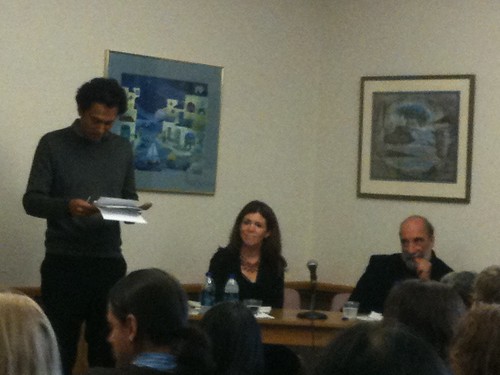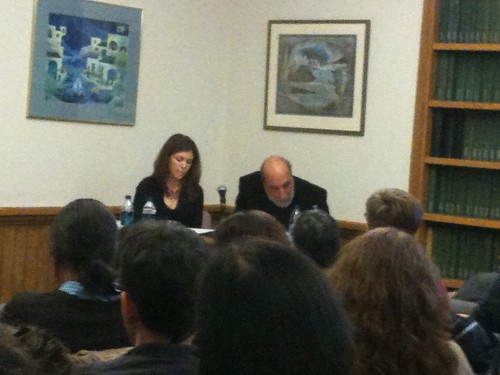Earlier this evening, the university's Poetry and Poetics Colloquium and Workshop held its first event of the fall, a reading by Raúl Zurita, accompanied by one of his many fine translators, Anna Deeny. A number of units within the university, as well as the Poetry Foundation, sponsored Zurita's visit, and for their generosity I offer deep thinks. I have previously written a little about Zurita's work on this blog, noting his former compatriot Robert Bolaño's imaginative (mis-)treatment of his life in the former's novels, especially Distant Star (Estrella distante), and even translating (a very tiny example of) one of his works, "[Zurita]," myself. When Zurita came through Chicago several years back, I was away, so I didn't get to see him, but I was determined not to miss tonight's event. And he did not disappoint. I won't try to recap the reading, which lasted a little under an hour, but I will say that I felt moved in a way I haven't by hearing poetry in a while, at least since last spring.
One of the things that Zurita's poetry offers is an sublime gravity, a dizzying weightiness masked by humor, breeziness, riduculousness, absurdity--the absurdity of a world in which people are disappeared or dropped out of planes or tortured for disagreeing with a political dictatorship, and the society for the most part looks in the other direction, closes its eyes, talks in circles, and enjoys the "economic successes" the murderous regime touts, which primarily benefit those at the top of the social, political and financial pyramid. Zurita read from several of his books, including Purgatorio (1979), Sueños para Kurosawa (2009), and the often astonishingly beautiful La vida nueva (1994), which plays with Dante's legendary title in rethinking what a new life might mean under the circumstances in which Zurita and his fellow countrypeople were living before and at the time he wrote the book. It forms the final title in a trilogy that includes Purgatorio and Anteparaíso (1982), the first of Zurita's works I ever came across, and itself a rethinking, in so many ways, of Dante's worldview, while also drawing on the aesthetic daring of that great poetic ancestor.
After the reading, Zurita answered questions from the audience, including responding to a fine one, I believe by my colleague Jorge Coronado, in which he noted off the cuff that it was only the desert, the mountains, and the sea that showed "compassion" to those who were killed or dropped onto or over these natural sites. I am still thinking about that one.

Jorge Coronado introducing Anna Deeny (translator) and Raúl Zurita

Anna Deeny and Raúl Zurita, reading his poetry
One of the things that Zurita's poetry offers is an sublime gravity, a dizzying weightiness masked by humor, breeziness, riduculousness, absurdity--the absurdity of a world in which people are disappeared or dropped out of planes or tortured for disagreeing with a political dictatorship, and the society for the most part looks in the other direction, closes its eyes, talks in circles, and enjoys the "economic successes" the murderous regime touts, which primarily benefit those at the top of the social, political and financial pyramid. Zurita read from several of his books, including Purgatorio (1979), Sueños para Kurosawa (2009), and the often astonishingly beautiful La vida nueva (1994), which plays with Dante's legendary title in rethinking what a new life might mean under the circumstances in which Zurita and his fellow countrypeople were living before and at the time he wrote the book. It forms the final title in a trilogy that includes Purgatorio and Anteparaíso (1982), the first of Zurita's works I ever came across, and itself a rethinking, in so many ways, of Dante's worldview, while also drawing on the aesthetic daring of that great poetic ancestor.
After the reading, Zurita answered questions from the audience, including responding to a fine one, I believe by my colleague Jorge Coronado, in which he noted off the cuff that it was only the desert, the mountains, and the sea that showed "compassion" to those who were killed or dropped onto or over these natural sites. I am still thinking about that one.

Jorge Coronado introducing Anna Deeny (translator) and Raúl Zurita

Anna Deeny and Raúl Zurita, reading his poetry










No comments:
Post a Comment